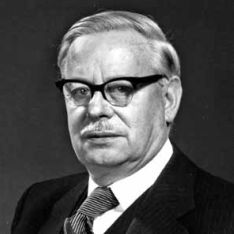
Biography
Ronald Haxton Girdwood will still be remembered as much for his modest and unassuming style as for his intellect. His distinguished place in medicine is based on a lifetime of professional achievement extending from his undergraduate performance at the University of Edinburgh to his presidency of the Royal College of Physicians of Edinburgh just prior to his retirement.
Born in Arbroath, Ronald Girdwood benefitted from Scottish philanthropy by winning a Carnegie scholarship which allowed him to enter the University of Edinburgh. The Carnegie Trust had every reason to be satisfied with their decision as Girdwood graduated with an honours degree. He was awarded the William Leslie Gold Medal and was named Ettles scholar as the most distinguished medical graduate of his year.
As with all young doctors of his generation, he was called to military service in World War II, serving mainly in India, reaching the rank of Lt Colonel. Outbreaks of tropical sprue, characterised by diarrhoea, glossitis, weight loss and anaemia occurred. Girdwood diagnosed the anaemia as megaloblastic but because folic acid was still unknown he used injections of liver extract and blood transfusions to keep all his patients alive. Eventually this anaemia was shown to be due to folate deficiency. In the course of his work in India, he met and married Mary Williams, a nursing Sister in the Queen Alexandra’s Imperial Nursing Service. They were a devoted couple for 62 years.
After the war, he continued his research on the megaloblastic anaemias in Edinburgh, at the University of Michigan at Ann Arbor and at Yale University at New Haven in the USA. The academic excellence of his research work resulted in a Gold Medal for his MD thesis in 1954, and he came to be held in high regard by his haematologist colleagues. He succeeded Professor Sir Derek Dunlop as professor of therapeutics in the University of Edinburgh in 1962 and held the Chair until his retiral in 1982; he was awarded the Cullen Prize by the Edinburgh College in 1970; he was Dean of the Faculty of Medicine from 1975 to 1982, overseeing the expansion of the medical school. He was admitted to the Royal Society of Edinburgh in 1978. As time passed, he was increasingly involved with administrative duties, and though he loved to complain about this, he delighted in his committee work. Always concerned about drug side effects, he was an obvious choice as a member of the newly established Committee on Safety of Medicines. He published extensively during his medical career, with over 100 papers and contributions to many textbooks.
Ronald Girdwood became President of the College in 1982 and he held this position until 1985. His presidency saw the building of the Queen Mother Conference Centre, and this was a manifestation of the increasing importance of postgraduate medical education in the College, though the establishment of an Education Department did not occur until 1992. Under his presidency the first College overseas meeting took place and he had a particular interest in the College’s overseas Fellows, and travelled extensively to see them. When he retired in 1985, he was appointed a Commander of the Order of the British Empire (CBE) for his services to medicine.
Notable Achievements
Girdwood was awarded the Cullen Prize by the Royal College of Physicians of Edinburgh Cin 1970.
He was Dean of the Faculty of Medicine from 1975 to 1982.
He was admitted to the Royal Society of Edinburgh in 1978.
Girdwood was president of the Royal College of Physicians of Edinburgh from 1982 to 1985.
Previously published in the Journal of the Royal College of Physicians of Edinburgh (2013), 43: 93
Author: N D C Finlayson.



